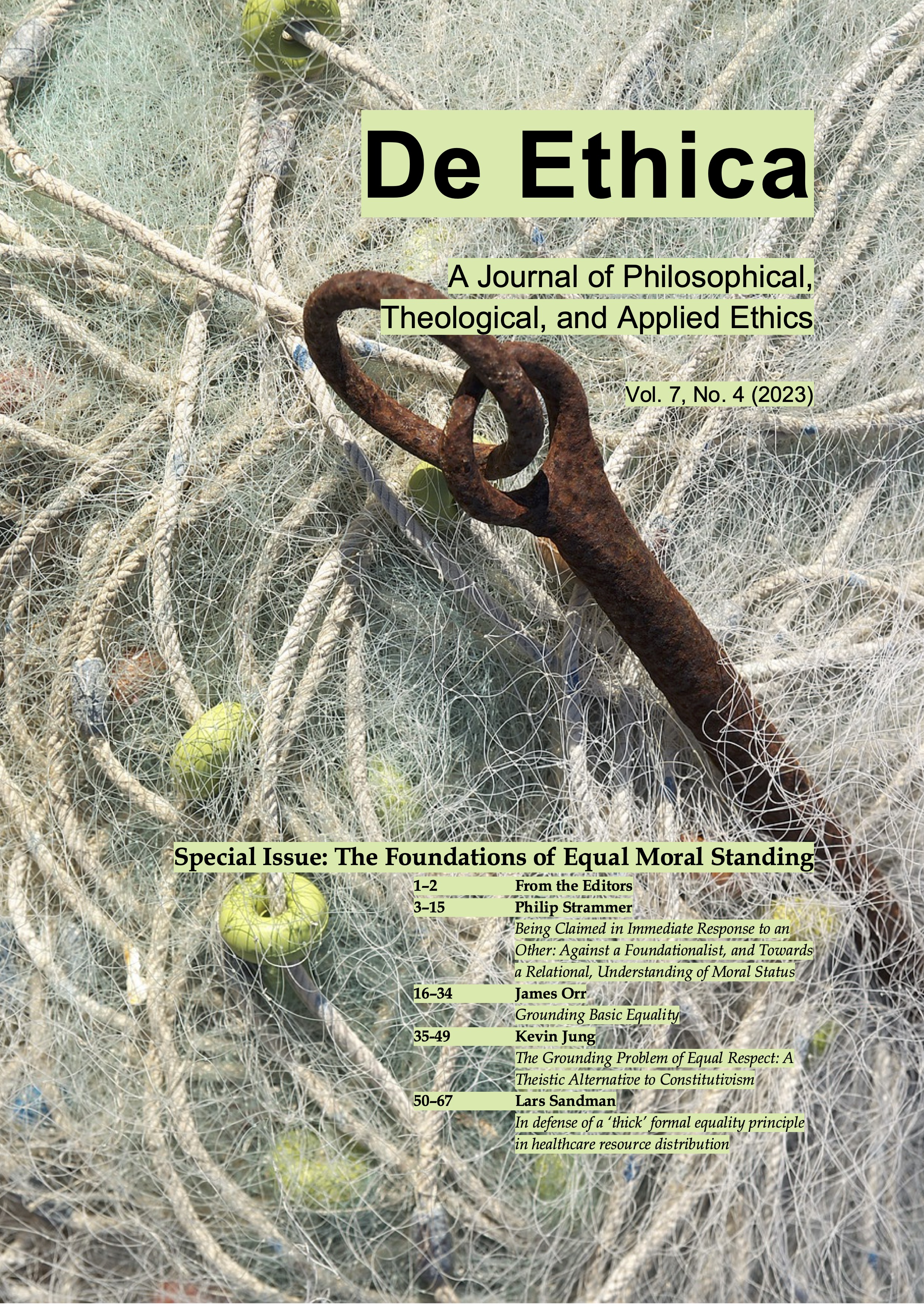The Grounding Problem of Equal Respect
A Theistic Alternative to Constitutivism
DOI:
https://doi.org/10.3384/de-ethica.2001-8819.237435Keywords:
human dignity, good simpliciter, fractals, neo-Aristotelian ethical naturalism, Kantian constructivism, Robert AdamsAbstract
In this paper, I explore three theories of value to illuminate how nontheistic and theistic accounts may differ in grounding human dignity: neo- Aristotelian ethical naturalism, Kantian constructivism, and a theistic account of good simpliciter. The theistic account of good simpliciter that I offer adapts Robert Adams’s notion of the transcendent Good as the Excellent. In this account, I explain how Adams’ thesis that goodness is a property consisting in a sort of resemblance to God may be understood in a new way, using ideas drawn from contemporary mathematics and quantum mechanics. On my account, we must value human beings neither because such valuing would be beneficial or necessary for human flourishing nor because it is a logical outcome of anything we care to value. Rather it is because we recognize the property of self-similarity in all of us, which may be understood as a resemblance to God as good simpliciter.
References
Adams, Robert M. Finite and Infinite Goods: A Framework for Ethics. New York: Oxford University Press, 1999.
Aeon, and Florence Williams. “Why Fractals Are So Soothing.” The Atlantic, January 26, 2017. https://www.theatlantic.com/science/archive/2017/01/why-fractals-are-so-soothing/514520/.
Aesop. “Library of Congress Aesop Fables.” Accessed May 23, 2022. https://read.gov/aesop/053.html.
Audi, Paul. “Grounding: Toward a Theory of the In-Virtue-Of Relation.” Journal of Philosophy 109, no. 12 (2012): 685–711.
Foot, Philippa. Natural Goodness. Oxford: Oxford University Press, 2001.
Friedenberg, Jay, Preston Martin, Naomi Uy, and Mackenzie Kvapil. “Judged Beauty of Fractal Symmetries.” Empirical Studies of the Arts 40, no. 1 (January 1, 2022): 100–120.
Geach, Peter. “Good and Evil.” Analysis 17, no. 2 (1956): 33–42.
Halpern, Paul. “Quantum Harmonies: Modern Physics and Music.” Accessed May 28, 2022. https://www.pbs.org/wgbh/nova/article/quantum-harmonies-modern-physics-and-music/.
Hursthouse, Rosalind. On Virtue Ethics. Oxford University Press, 1999.
Idris, Zamzuri. “Quantum Physics Perspective on Electromagnetic and Quantum Fields Inside the Brain.” The Malaysian Journal of Medical Sciences 27, no. 1 (February 2020): 1–5.
Idris, Zamzuri, Zaitun Zakaria, Ang Song Yee, Diana Noma Fitzrol, Abdul Rahman Izaini Ghani, Jafri Malin Abdullah, Wan Mohd Nazaruddin Wan Hassan, Mohd Hasyizan Hassan, Asrulnizam Abdul Manaf, and Raymond Ooi Chong Heng. “Quantum and Electromagnetic Fields in Our Universe and Brain: A New Perspective to Comprehend Brain Function.” Brain Sciences 11, no. 5 (April 28, 2021): 558.
Ieva, Antonio Di. “The Fractal Geometry of the Brain: An Overview.” In The Fractal Geometry of the Brain, edited by Antonio Di Ieva. New York: Springer, 2016.
Kant, Immanuel. The Metaphysics of Morals. Translated by Mary Gregor. Cambridge: Cambridge University Press, 1993.
Kempkes, S. N., M. R. Slot, S. E. Freeney, S. J. M. Zevenhuizen, D. Vanmaekelbergh, I. Swart, and C. Morais Smith. “Design and Characterization of Electrons in a Fractal Geometry.” Nature Physics 15, no. 2 (February 2019): 127–31.
Kim, Jaegwon. “What Is ‘Naturalized Epistemology?’” Philosophical Perspectives 2 (1988): 381–405.
Korsgaard, Christine M. Creating the Kingdom of Ends. New York: Cambridge University Press, 1996.
———. Self-Constitution: Agency, Identity, and Integrity. New York: Oxford University Press, 2009.
———. The Sources of Normativity. New York: Cambridge University Press, 1996.
Kraut, Richard. “Desire and the Human Good.” Proceedings and Addresses of the American Philosophical Association 68, no. 2 (1994): 39–54.
Mandelbrot, Benoit B. “Fractal Geometry: What Is It, and What Does It Do?” Proceedings of the Royal Society of London 423, no. 1864 (May 8, 1989): 3–16.
McDowell, John. “Non-Cognitivism and Rule-Following.” In The New Wittgenstein, edited by Alice Crary and Rupert Read, 38–52. New York: Routledge, 2002.
Nussbaum, Martha C. Creating Capabilities: The Human Development Approach. Harvard University Press, 2013.
———. “Human Dignity and Political Entitlements.” In Human Dignity and Bioethics: Essays Commissioned by the President’s Council on Bioethics. Washington, D.C, 2008. https://bioethicsarchive.georgetown.edu/pcbe/reports/human_dignity/chapter14.html.
———. Sex and Social Justice. New York: Oxford University Press, 1999.
———. The Fragility of Goodness: Luck and Ethics in Greek Tragedy and Philosophy. 2nd edition. New York: Cambridge University Press, 2001.
———. Upheavals of Thought: The Intelligence of Emotions. New York: Cambridge University Press, 2003.
Parfit, Derek. Reasons and Persons. Oxford: Oxford University Press, 1986.
Piller, Christian. “What Is Goodness Good For?” In Oxford Studies in Normative Ethics, Volume 4. Oxford: Oxford University Press, 2014.
Scanlon, Thomas M. What We Owe to Each Other. Cambridge: Harvard University Press, 1998.
Tegmark, Max. Our Mathematical Universe: My Quest for the Ultimate Nature of Reality. New York: Alfred A. Knopf, 2014.
Wedgwood, Ralph. The Nature of Normativity. Oxford: Oxford University Press, 2009.
Downloads
Published
How to Cite
Issue
Section
License
Copyright (c) 2023 Kevin Jung

This work is licensed under a Creative Commons Attribution 4.0 International License.

